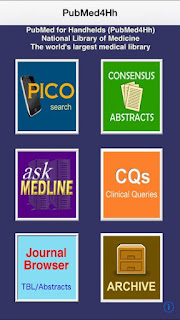 |
| Photo by stockmedia.cc/CC BY 3.0 |
By Ariel Pomputius, MLIS, University of Florida
Apps have been on my mind recently. If you can think it, there’s almost certainly an app for that, particularly in the medical field (I’m looking at you oddly-specific-but-apparently-very-accurate baby due date calculator), and the new generation of future healthcare professionals turns to the phone in their pocket for the answer before they even think to turn to the nearest computer terminal. In response to a recent survey at our organization in which our library patrons clamored for more mobile information resources, a coworker and I are developing a class on “Mobile Resources for Health” (yes, we suffer from a lack of creativity regarding class titles, feel free to offer suggestions in the comments) which thus far consists mainly of a large collection of interesting apps and advice on how to find more.
So here’s a few of the VERY basic apps that I’ve found in my research for that class. These are essential for everyone from first year medical students to senior reference librarians to have on their smartphones or tablets. If these aren’t particularly new or interesting to you, please feel free to suggest alternatives (or champion the ones you do use!) in the comments section.
PubMed (Mobile and For Handhelds)
Price: Free
No discussion of information resources for health would be complete without a nod to PubMed. NLM has a whole slew of apps for librarians, healthcare professionals, and the general public, but everyone knows PubMed. Fortunately, there’s two versions available for your mobile tech:
- PubMed Mobile, which is actually just the mobile website version of PubMed with a very basic search bar, but can be saved to your device’s homescreen as a shortcut
- PubMed for Handhelds, which features multiple ways to search PubMed through 6 large buttons focused on evidence-based medicine searches at your fingertips
Price: Free
Most of the medical students I know swear by Epocrates, an app that provides drug, disease, and diagnostic information at the point of care. While there’s other drug information apps out there (cheers, Micromedex and Lexi-Comp!), Epocrates is free, easy-to-use, and still accurate enough that you can admit to the attending you got the information from Epocrates and not get labelled the class dunce of your clerkship team (or keep up with all the medical terminology if you are their rounding librarian).
Price: Free
A coworker shared Evernote with me after a traumatic accident deleted all the notes stored in my phone (okay, so it wasn’t that traumatic…I dropped my phone in a puddle). The basic version of Evernote is free and allows you to save notes, pictures and web pages and then access them through any device with the Evernote app. Courtesy of their OCR tech, you can even search for text inside the pictures you take. Goodbye static To-Do lists, hello organization!
Is this too basic? Is this helpful? We won’t know unless you
tell us! In the spirit of collaboration, please share your thoughts below.
 Ariel Pomputius is a
recent library school grad and a brand new Health Sciences Liaison Librarian at
the University of Florida. Right now she
is in the process of self-training as a medical mobile tech expert for her
department, but thus far that just involves reading a lot of articles written
by people much more experienced than her. She’s found some great apps for
ophthalmology though!
Ariel Pomputius is a
recent library school grad and a brand new Health Sciences Liaison Librarian at
the University of Florida. Right now she
is in the process of self-training as a medical mobile tech expert for her
department, but thus far that just involves reading a lot of articles written
by people much more experienced than her. She’s found some great apps for
ophthalmology though!
To contact her, please email apomputius@ufl.edu.





No comments:
Post a Comment